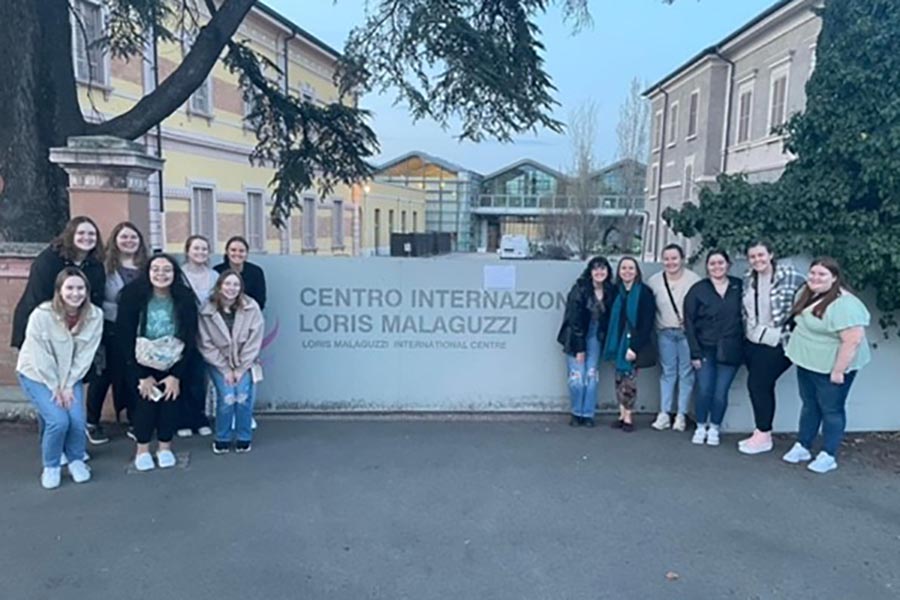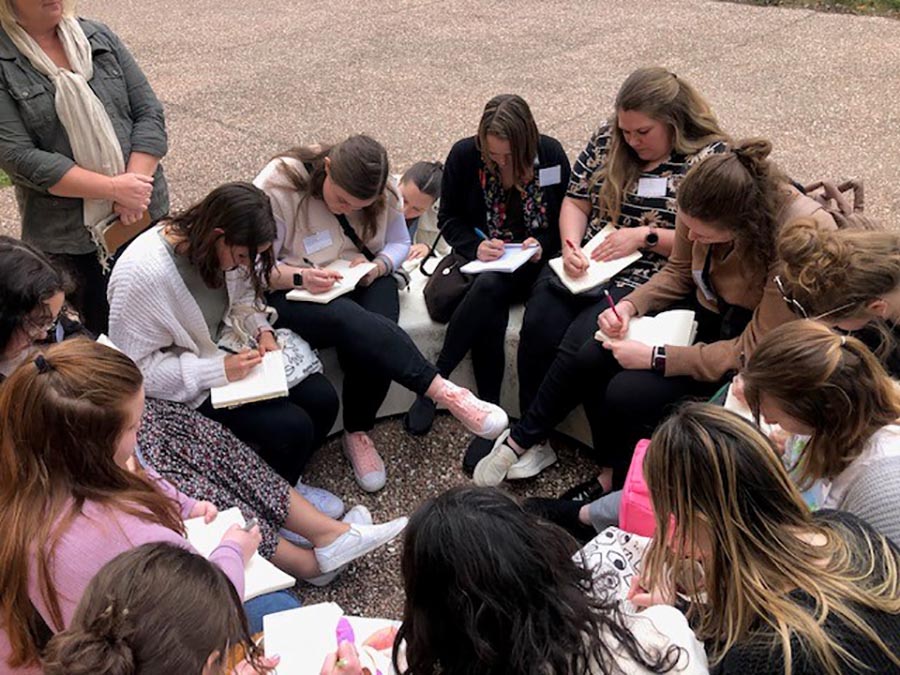Students and professional educators at Northwest Missouri State University returned this spring to Reggio Emilia, Italy, where they spent a week learning about that region’s approach to preschool and primary education.
The team of students, faculty and staff members representing Northwest’s School of Education and its Horace Mann Laboratory School traveled March 18-25 to Reggio Emilia, Italy, converging with a larger group of representatives from colleges and universities throughout the United States.

Northwest education students participated in a visit this spring to Reggio Emilia, Italy, where they spent a week learning about the region’s approach to preschool and primary education. (Submitted photos)

In addition to touring schools and observing teaching practices, the study abroad experience included presentations from teachers and other professionals who work in the Reggio schools. Each night, the Northwest team reconvened to discuss their observations and share insights from the day.
The Reggio Emilia approach is an educational philosophy developed for preschool and primary education that encourages play and exploration as a vehicle for learning. The study abroad experience provides participants with hands-on professional international experience to reinforce their corresponding academic coursework.
While classrooms Northwest’s Horace Mann and the Phyllis and Richard Leet Center for Children and Families employ the Reggio Emilia Approach, the study abroad experience provides Northwest students, faculty and staff with opportunities to examine new ways of teaching children. It also helps Northwest students gain new perspectives on education systems and methods used outside the United States as they begin their own teaching careers.
Paige Holbrook, who completed bachelor’s degrees at Northwest this spring in elementary education and special education: cross categorical, said she was fascinated to observe the ways Reggio Emilia teachers did not regulate students’ curiosities and allowed children to explore topics that interested them.
“I also love the community aspect that they had in their schools, and I would love to have that in my classroom amongst my students,” said Holbrook, who spent the spring semester student teaching at Carriage Hill Elementary School in Papillion, Nebraska. “I would love for them to rely on me, I rely on them and then they also rely on each other.”
Assistant Professors of Professional Education Dr. Rebecca Moore and Dr. Sandy Seipel led the study abroad experience with Racheal Wood, an associate teacher at the Phyllis and Richard Leet Center for Children and Families, and Heather Montenguise, a first grade instructor at Horace Mann.
The study abroad group visited prominent cities in Italy, renowned municipal infant toddler centers and preschools as well as an international school that continues to be a subject of interest, research and exchange on the part of students, educators, researchers, administrators, and political and cultural figures throughout the world.
Moore said the experience allowed educators to immerse themselves in the Reggio Emilia culture and better understand the capabilities of children.
“There is value in allowing children to lead their learning and their development,” Moore said. “As their teachers, we’re there to facilitate that learning.”
Moore added, “My hope is that when students experience the Reggio Emilia philosophy and immerse themselves in the culture, they begin to see the worthiness and potential of every child.”
Jillian Clifford, who graduated from Northwest this spring with a bachelor’s degree in early childhood education, also said she enjoyed seeing families play a hands-on role in their children’s education.
“I was surprised about how authentic everything was,” Clifford said. “The students had so much choice in what they were doing and the materials that they were using were real, not just toys. It felt like they were learning not only academics but also life skills that they can apply in their home life.”
In addition to daily tours of Reggio schools, presentations by Reggio educators informed the study group about the approach’s history as well as the special rights and resources provided to children. Each night, the Northwest team reconvened to discuss their observations and share insights from the day.
Annika Salmons, a senior early childhood education major from Silex, Missouri, said building connections with other educators, experiencing the culture and learning about the histories of Italian cities were highlights for her. She plans to leverage the experience and apply it to her teaching career.
“I will utilize the organization of the classroom, the language that they use when speaking to children, and some of their strategies for observation,” Salmons said. “I will also use this experience to expose my students to different cultures within our classroom because I feel it is important that they learn about them.”